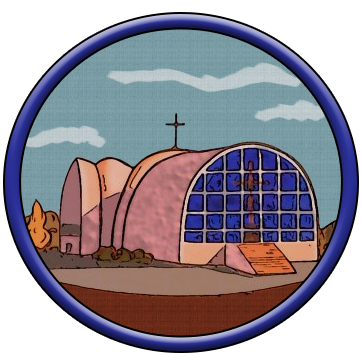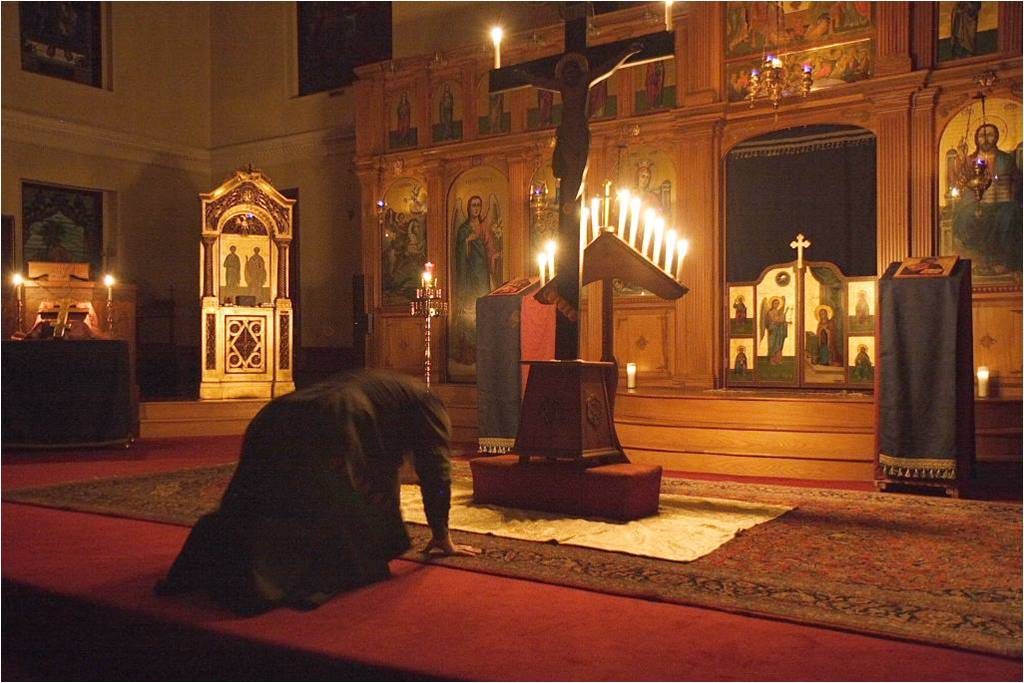The Great Canon of St. Andrew of Crete
(The Poklony Service)
Each year the Canon of St. Andrew is read during the first week in Lent and prayed in a fuller way in the 5th week of Lent. We also know this service as the Poklony (Prostrations) Service since in its entirety there are some 350 profound bows to the ground. The service symbolizes the spirit of penance during Lent in our Eastern Church.
There is no other sacred hymn which compares with this monumental work, which St Andrew wrote for his personal meditations. The canon is a dialog between St. Andrew and his soul. The ongoing theme is an urgent exhortation to change one’s life. St Andrew always mentions his own sinfulness placed in juxtaposition to God’s mercy, and uses literally hundreds of references to good and bad examples from the OT and NT to “convince himself” to repent.
In this hymn, all the events in Scripture involving humankind are made personal. The scenes of the Bible pass in front of us and we relive them deeply. The story of creation, the fall and redemption become the story of my creation, my fall and my redemption. The Canon brings us into Scripture and uses powerful imagery to help us realize the depth of our sin. We realize how far we are from Christ and we are moved to repentance.
During the canon, we sing Tropars that honour St. Mary of Egypt and St. Andrew of Crete. St. Mary of Egypt led a very sinful life before repenting on a pilgrimage to the Holy Land. Afterwards, she went into the desert where she spent the rest of her life in prayer and sorrow for her sins. She is an example to us and inspires us to conversion, sorrow and atonement for sin. St. Andrew of Crete was the archbishop of a city on the island of Crete. He was a gifted preacher, writer and poet who composed many church hymns and canons, including the Great Canon.
General Themes of the Great Canon
How we should think about ourselves: Where shall I begin to lament the deeds of my wretched life? What first-fruit shall I offer, O Christ, for my present lamentation? But in Thy compassion grant me release from my falls.
Desire to change dialogue with the soul: Come, wretched soul, with your flesh, confess to the Creator of all. In the future refrain from you former brutishness, and offer to God tears of; repentance.
Recognizing Reality: The end is drawing near, my soul, is drawing near! But you neither care nor prepare. The time is growing short. Rise! The Judge is at the very doors. Like a dream, like a flower, the time of this life passes. Why do we bustle about in vain?
How to pray – Laments and supplications to God:Thou art the Good Shepherd; seek me, Thy lamb, and neglect no me who have gone astray.
OT and NT examples of righteousness and unrighteousness, for the purpose of emulation or avoidance:I have reviewed all the people of the Old Testament as examples for you, my soul. Imitate the God-loving deeds of the righteous and shun the sins of the wicked.
The most important thing to know about the Great Canon: The Great Canon was written by a holy man to teach himself the right way to live. We cannot benefit from it unless we make it a priority to stand in prayer, in the church, and listen to it, with a great desire and expectation for God’s grace to teach us and heal us.
My soul, my soul, Arise!
Why are you sleeping?
The end is drawing near,
And you are confounded,
Awake then and be watchful
Who is everywhere and fills all things.
We have sinned, transgressed, done wrong before You.
We have not watched or done as You have commanded us,
but do not give us up utterly, O God of our fathers.
Have mercy on me, O God, have mercy on me.
Kontakion and Ode from the Great Canon
Adapted with appreciation from:
greatlent/great-canon-of-andrew-of-crete

